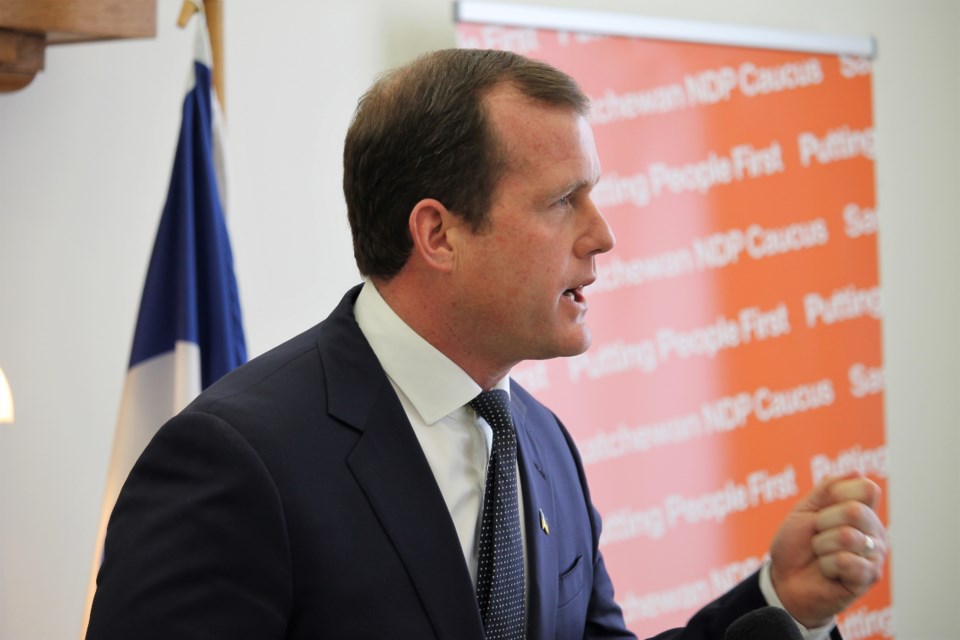REGINA — The Saskatchewan NDP responded to the provincial government’s 2022-23 fiscal budget with plenty of criticism on Wednesday, claiming the budget isn’t providing for the province’s average taxpayers.
Finance Minister Donna Harpauer presented the budget in the legislature on March 23, projecting an estimated deficit of $463 million in the coming fiscal year.
Highlights of the budget include the addition of PST to a number of purchases, including entertainment like concert and sporting event tickets, gym memberships and museums.
Harpauer also introduced a tax increase of 2.6 per cent on property mill rates, and a tax increase on tobacco products.
Party leader Ryan Meili and Finance critic Trent Wotherspoon said the government’s presented budget is targeting individual Saskatchewan residents and consumers still grappling with pandemic effects.
“This is a government that is nickel-and-diming Saskatchewan people at a time when they desperately need relief,” said Wotherspoon. “The government shouldn’t be trying to balance its books on the backs of people and households across Saskatchewan.”
Wotherspoon said that many are struggling with high gas prices at the pump, rising food costs and tax increases, but the provincial government has introduced 32 new tax hikes instead of financial support or tax credits.
“This is a no-help budget,” said Wotherspoon. “Not a stitch of relief for working families that are doing all they can to keep their heads above water and pay the bills.”
The average homeowner in Saskatchewan will pay an additional $13 per year as a result of the property tax increase, and the new PST charges are expected to generate about $20 million in revenue annually — approximately the amount needed to reduce surgical wait times in the next four years, as promised.
Harpauer said the increases will be minimally noticeable to the average taxpayer, and that the PST changes were made to align more fully with federal GST provisions.
She also said the government felt residents would be willing to pay the extra dollars to improve health care waitlists.
“If I said to a Saskatchewan residents, ‘Would you be willing to pay this for two concerts or a Rider ticket, in order for us to address the very critical surgical waitlist?’ [then] I think Saskatchewan people would support that,” said Harpauer.
Wotherspoon also said that taxing entertainment purchases, like concert tickets or sporting events, is a direct affront to the residual effects of the pandemic.
“[They are] sticking those costs directly on the sorts of events that bring us together and support the arts, that allow us to celebrate,” said Wotherspoon.
Wotherspoon said that while the NDP is in favour of a balanced budget for the province, the opposition does not feel the Sask Party is attempting to achieve that in the best way.
“The government shouldn’t be trying to balance its books on the backs of people and households across Saskatchewan,” said Wotherspoon.
Meili criticized the Sask Party for what the NDP said is another year of underfunding public services, like education, health care and social supports for the vulnerable.
The NDP feels the budget has failed to properly address areas like worker retention, long term care improvement and mental health and addictions, said Meili.
He also critiqued the province’s touting of a $20 million allocation to reduce surgical wait times, which he said was a two-year-old promise made before the pandemic exacerbated the problem.
“We haven’t seen this government acknowledge the choices that they made along the way that have increased those surgical backlogs,” said Meili. “What we should be seeing right now, that the pandemic revealed about health care, is a generational investment.”
Wotherspoon said the province’s revenue is currently soaring, making it possible to provide targeted tax reliefs as well as fuller funding commitments to areas including education and health care.
The NDP has recently been calling for a temporary stay on fuel tax in the province, as a relief measure, as well as a reduction in auto insurance rates from SGI in the wake of two customer rebates in the past year.
The opposition has also been looking to see PST removed from children’s clothing, which was not a decision made in this year’s budget.
Wotherspoon said the provincial government is covering the costs of the pandemic’s strain on the health care system through taxpayer pressures.
“We’re paying the price for this government’s mismanagement,” said Wotherspoon. “We have a government that’s failing to seize the opportunity to make life more affordable for Saskatchewan people.”




